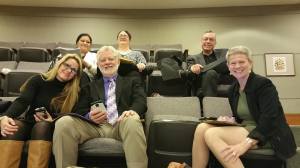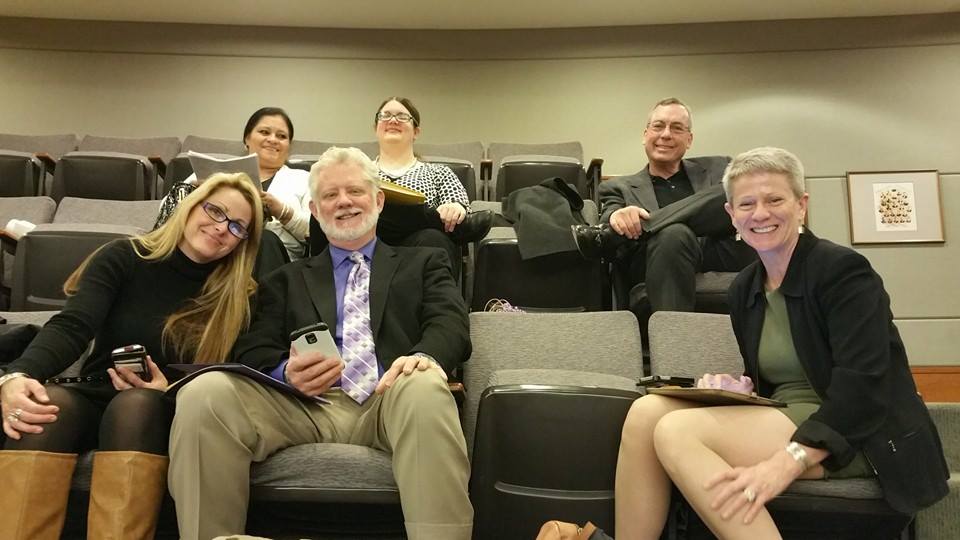HEAL and NEST director Coleen Widell and other advocates from around the state have been on the scene at the State Roundhouse, advocating tirelessly with Representatives and Senators to help make things a little better when it comes to eradicating domestic violence.
As part of all this lobbying, Team HEAL members participated in HEAL Lobby Day on Feb. 23-24 in the Roundhouse, when board and staff members joined Widell in Santa Fe to get a taste of the work being done. “It is a great day that allows for all advocates – board members and shelter workers alike – to get a feel for the global nature of our work,” Widell stated. In attendance were board members Julie Gilliland, Rick Hutchison, Sheri Rodgers, Lynn Crawford and Greg Cory, and staff members Amy Cerny and Becky Reynolds.
Among the bills Team HEAL has been working on are the Confidential Substitute Address Act, which will create, in the Secretary of State’s office, a comprehensive confidential substitute address program to help victims of domestic violence, sexual offenses and stalking, and their children, start new lives in peace and to provide added protections to their overall safety.

A person attempting to escape from actual or threatened domestic violence, a sexual offense or stalking frequently moves to a new address in order to prevent an abuser or potential abuser from finding him or her. This new address, however, is only useful if an assailant or potential assailant does not discover it. This bill would allow for the confidentiality of a victim’s address to be maintained through the use of a substitute address in the Secretary of State’s Office that would be accepted for purposes of public records and confidential mail forwarding.
For the fourth year, advocates will attempt to get passed a Suffocation and Strangulation bill. This bill, sponsored by Senator Daniel Ivey–Soto and co-sponsored by Representative Zach Cook, amends three existing civil and criminal statutes (Aggravated Battery Against a Household Member, the Child Abuse and Neglect Act and the Family Violence Protection Act) by adding the definitions of Strangulation and Suffocation.
Currently in New Mexico, there is no legal definition for either strangulation or suffocation. This bill would define those words in layperson’s terms. This bill does not create a new crime. It merely defines strangulation and suffocation in the context of existing law.
Because most strangulation victims do not have visible injuries, even in fatal cases, it is very difficult for prosecutors to get convictions. Without legal definitions to help jurors in felony cases, prosecutors are forced to charge very serious acts of abuse as misdemeanor domestic violence assaults, which too often are reduced to lesser charges or simply dismissed altogether.
Strangulation is lethal force and is one of the best predictors of a future homicide in domestic violence cases. Death by strangulation or suffocation can happen quickly. Loss of consciousness can occur within 5 to 10 seconds and death within 4 to 5 minutes.
Currently, 44 states, the District of Columbia, the Federal government and two territories have some form of strangulation or impeding breathing statute.
The Barber Licensure After Apprenticeship bill would open up the possibility of those seeking a barber’s license to receive apprentice training without having to travel to a barber school. As most schools are in metro areas of the state – hundreds of miles away from where many rural domestic violence shelters are located – the hardship placed on those already victimized by domestic violence may be enough to keep them from pursuing this chance at a solid career that could lead to path of self-sufficiency. Some of the barber and cosmetology schools are in opposition to this bill.
A bill sponsored by Representative Carl Trujillo would allow a judge to sentence a violator of a protection order to wear a GPS device to ensure s/he does not enter designated “protection order exclusion zones.” If violated, the victim and law enforcement would be notified immediately. This is an important bill that achieves many objectives, including enhanced victim protection, further accountability of the offender to the court and reduced incarceration fees for the tax payer.
Altogether, HEAL is monitoring over 20 bills this session that relate, in one way or another, to the women and children served at The Nest.
According to HEAL Vice President Rick Hutchison, who also gave the morning invocation in the House of Representatives, “It is important for each of us to be engaged in political advocacy for the survivors who depend on us to be their voice. Many of us were able to go to Santa Fe this year to meet with our legislators and give public input at committee hearings. Many others could not travel but helped by calling committee members and encouraging them to vote a certain way. This work takes all of us to properly represent the women and children we serve at The Nest.”


